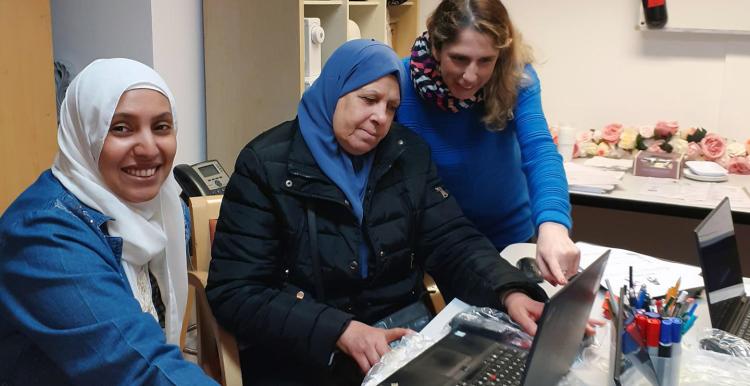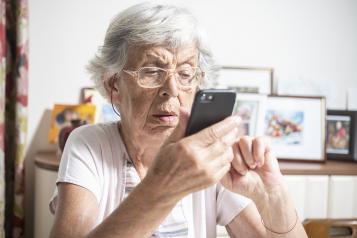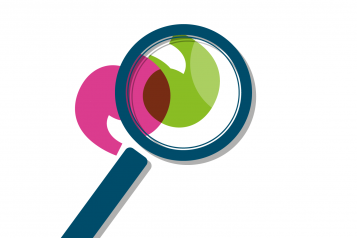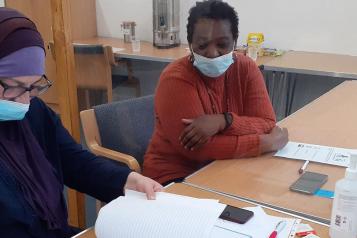Learn how Healthwatch provides digital support to community groups in Islington

Gulum (right) with staff member and digital learner at Jannaty Women's Social Society
Thanks to the free device and data, we could make savings and use this money for gas and electricity bills.
Digital exclusion is a serious issue for many groups in society. As part of my role managing our digital inclusion project, I visit the community organisations we partner with in our wider Healthwatch work to provide digital training to some of the residents they support.
Jannaty is based on Seven Sisters Road. The organisation works to empower women and girls from disadvantaged minority ethnic backgrounds. Most of the women they support belong to the Arabic-speaking community. On today's visit, I met with five digital learners and two members of staff. Some of the learners’ SIM cards had expired so I gave them new ones. These SIM cards give them access to free data. They are entitled to free data for 12 months thanks to a scheme known as the National Databank which has been developed by the Good Things Foundation, a national charity promoting digital inclusion.
As well as distributing free data, we've also been giving out refurbished devices to help fight digital poverty. This year we’ve been able to distribute 80 of them, tablets, phones, and laptops, to digitally excluded residents. As the cost of living crisis deepens, this offer has helped many families to stay connected.
It's a great feeling to be able to provide such practical help. Learners often tell me that their family shares a single mobile phone and their children need to use it for entertainment and school work. The impact of receiving a new, more appropriate device can be huge.
"I usually share my mobile phone with my kids for their homework. From now on, they will be able to have access to Educake on my new tablet to do their Maths homework. Thank you so much!"
Going online to access health services
When I talk to residents about digital skills I also cover the online tools we all can use to access health and care services. On this visit, I introduced several health-related apps: namely the NHS app, Econsult, Accuryx, and AttendAnywhere.
- Many of the learners had already been using the NHS app but found it impractical as they couldn’t use it to book appointments.
- One learner gave me some feedback about eConsult. She felt that the eConsult form asked too many questions, and sometimes, because the system didn’t accept what she wrote, she found that she needed to keep going back while filling out the form. On a more positive note, she said that whenever she completed the eConsult form she got a call from her GP the same day.
The main barrier for Jannaty learners is language
We discussed the language barrier that prevents many people from using both eConsult and the NHS app because they can’t write in English and the system cannot understand other languages. I showed the learners how they could use Google Translate and ChatGPT to generate and translate sentences explaining their health conditions. However, we were not sure how well the tools worked in different languages.
- One learner felt that the design of tools like eConsult and GP websites could be improved, saying that especially for elderly people it might be difficult to navigate the sites and find the correct buttons or headlines.
I also showed off some new apps recommended by the NHS to support people to go running, quit smoking, lose weight, and look after their mental health. There was quite a lot of interest in these, which was nice to see.
Gathering feedback on services and giving information and advice
Even though these sessions have a digital focus, it's also a great opportunity to carry out our core Healthwatch work. People still take the opportunity to give their views on health and care services or to ask us for help with a problem. Today the learners complained that they found it too hard to contact their GP. They must call the GP in the morning, and then wait in the telephone queue for such a long time to talk to a person. The process is difficult. We hear this message frequently. We hope that the steps commissioners have taken to improve the experience of phoning the GP will start to make things easier. If that doesn't happen it's our job to let commissioners know that more improvement is needed.
One lady told me about a medical problem she had been putting up with for several weeks. Although she had tried to reach the GP she felt they hadn’t taken her seriously, and she was still waiting to be seen. I passed her details on to my colleague Senait, who provides our signposting service and will be able to help.
This year, we were able to distribute data, laptops, phones, and tablets thanks to support from Cloudesley, which is a local charitable trust, and the Good Things Foundation. If you are interested in finding out more about the National Databank and National Device Bank follow the links.


